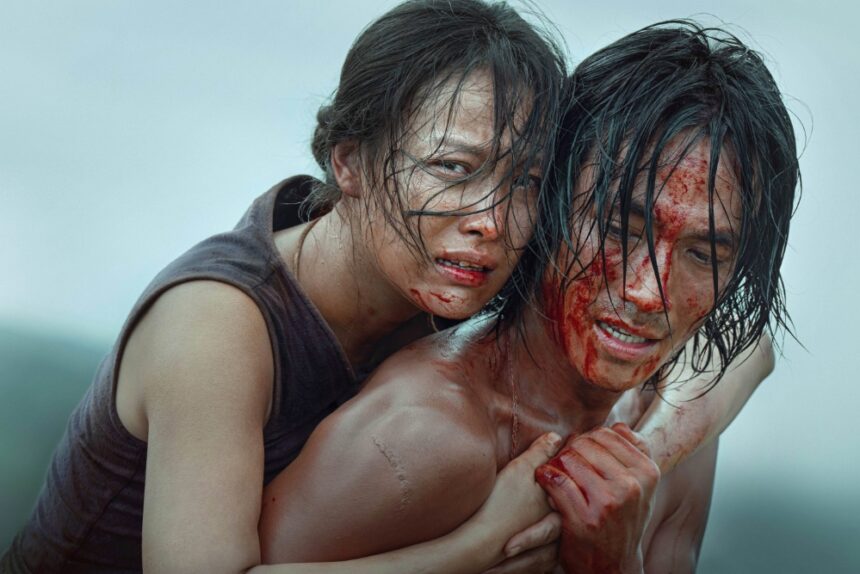Entertainment news Celebrity gossip Movie and TV show updates Latest celebrity news Trending entertainment stories
Zhu Yilong trained extensively in free diving. Ni Ni built up her physique to look like a 1940s fisherwoman. And for co-director Fei Zhenxiang, the underwater epic about one of WWII’s most harrowing rescue missions meant working in complete collaboration with his mentor.
“Dongji Rescue” dramatizes the real-life Lisbon Maru incident of October 1942, when Chinese fishermen rescued over 384 British prisoners of war after their transport ship was accidentally torpedoed by an American submarine. Co-directed by Cannes winner Guan Hu (“Black Dog,” “The Eight Hundred”) and Fei Zhenxiang, the film tells their story of rescue against the backdrop of wartime occupation.
Co-director Fei Zhenxiang explains the creative partnership with his collaborator. “We have a teacher-student relationship — what Chinese people call ‘master and apprentice.’ So in creating the script, including filming and everything else, it was all completed together,” Fei says.
Popular on Variety
This collaborative approach extends to the film’s central challenge: balancing spectacular maritime action with intimate human drama. “Because this is based on a real historical event, the event itself involved people against the sea, against heaven and earth,” Fei explains. “So the story itself possesses this possibility of combining them together, because it flows naturally.”
Lead actor Zhu Yilong, known for performances in Cannes selection “Only the River Flows” and “Lost in the Stars,” details the extensive preparation required for his role as fisherman Ah Bi. “First, in terms of skills, we did thorough preparation beforehand, training in diving and free diving, and constantly matching the intensity of the entire filming process in terms of physical fitness,” he says.
The psychological preparation proved equally demanding. “Because this is based on a real historical event, before filming we looked at a lot of materials, then had extensive communication with the directors. The entire film crew also gave us a very good on-location filming environment. What we needed to do was make all preparations, then relax, and after entering the real environment, express all the real emotions we felt,” Zhu adds.
When asked about how his previous internationally recognized work influences his role choices, Zhu emphasizes character-driven selection: “I’ve always chosen works focusing on characters. For me, characters that can resonate with me, that I can feel have a real sense of existence, including their richness and character arc — if I can resonate with them, I will choose them.”
The production faced significant technical challenges, with underwater sequences comprising over 40% of the runtime. The Imax format film utilized robotics for subsurface filming and demanded extensive breath-holding performances from cast members, with full-scale ship recreations constructed on location at Dongji Island.
Ni Ni, who stars alongside Zhu as another island resident, Ah Hua, describes her comprehensive approach to embodying a 1940s fisherwoman. “First, to get close to this character, I had to work out, because this fisherwoman’s image requires a strong physique and a skin tone more suitable for that period,” she explains.
The preparation extended beyond physical transformation. “We would look up a lot of materials and pictures online, then watch documentaries. When the director brought all of us actors together on an island, we got to know each other, put on costumes and dressed up as fishermen, entered into the characters. We stood on the mountaintop and felt the resonance this island brought us,” she adds.
Despite her diverse filmography spanning different eras and genres, Ni Ni finds common threads in her characters. “Although they exist in different times or have different personalities, I think the essence is the same because they’re all human. How we perceive the world, how we feel joy, anger, sorrow and happiness, how we feel the changes our surrounding environment brings to ourselves — it’s all similar.”
As the film prepares for its European release, with a London premiere that took place Aug. 15 marking the 80th anniversary of VJ Day, the cast emphasizes the story’s universal appeal.
“What we want to convey to all audiences around the world in our film is humanism — it doesn’t recognize national boundaries,” Zhu Yilong states. “Conscience is humanity’s final bottom line.”
Ni Ni expands on the humanitarian themes: “No matter what era we’re in, we must revere and respect life — every life. This life doesn’t recognize national boundaries or any gender. We must revere, cherish, and respect life, and we must also cherish peace.”
Producer Liang Jing explains the timing and epic scale of the production: “The scale exists because the filming difficulty is genuinely that challenging — it’s not scale for scale’s sake. This is a story between people. In terms of timing, it definitely has historical significance because Aug. 15 is the 80th anniversary of the victory against fascism worldwide, so its release in the U.K. is very meaningful.”
“Dongji Rescue” premieres in U.K. and Irish cinemas Aug. 22, with other European territories following from Aug. 29, distributed by Trinity CineAsia in partnership with Seventh Art Pictures. The film released in China Aug. 8.







